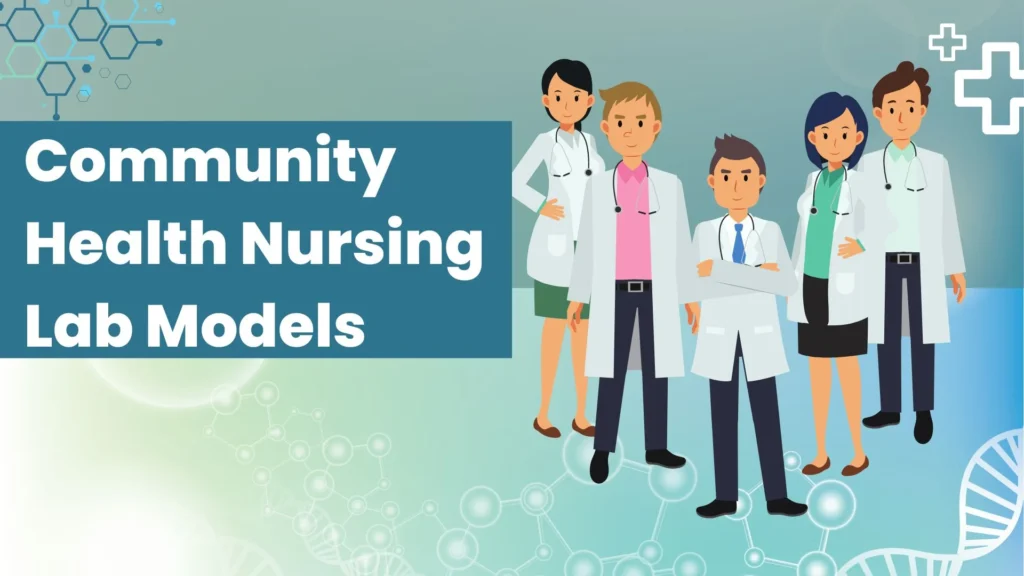Community health nursing lab models are vital in the instruction of nursing scholars and healthcare experts. They provide an experiential approach to imparting the fundamental notions of community health nursing, like the promotion of health, disease prevention, and population health management. In this discourse, we will explicate the various community health nursing lab models, their advantages, and how they contribute to the overall triumph of community health nursing.
Thank you for reading this post, don't forget to subscribe!


Introduction
Community health nursing is an exclusive realm of nursing that concentrates on augmenting the health and wellness of the community through healthcare services, education, and support. Community health nurses work intimately with individuals, families, and communities to promote robust lifestyles, prevent ailments, and control chronic conditions. To groom nursing scholars and healthcare experts for this specialized arena, community health nursing lab models have been instituted.
The Purpose of Community Health Nursing Lab Models
The prime purpose of community health nursing lab models is to offer an experiential and hands-on tactic to learning the core concepts of community health nursing. These models imitate practical scenarios that nurses may come across in their profession. By providing an emulated setting, nursing scholars can acquire the requisite skills and knowledge to function proficiently in a community health context.
You May Also Like:
Everything You Need to Know About IM Injection Deltoid Angle
How to Deal with Stress as a Nurse in India
Tips for Nursing Students: How to Succeed in Nursing Education
Types of Community Health Nursing Lab Models
There are several varieties of community health nursing lab models, including:
Standardized Patients
Standardized patients are actors trained to simulate realistic scenarios. They are frequently implemented in community health nursing labs to assist scholars in honing their communication skills and learn how to work competently with individuals from multifarious backgrounds.
Case Studies
Case studies are a widespread pedagogical tool used in community health nursing labs. These scenarios are tailored to aid scholars in developing critical thinking skills and learn how to put their knowledge into practice.
Simulation Labs
Simulation labs are designed to emulate practical situations in a controlled environment. These labs may encompass high-fidelity mannequins, computer software, and other simulation tools to provide scholars with hands-on experience in a secure and controlled milieu.
Community-Based Learning
Community-based learning is a model that necessitates scholars to work straightaway with the community. This model presents scholars with an opportunity to develop their skills in a real-world context and learn how to work with individuals and communities to foster health and prevent ailments.
Benefits of Community Health Nursing Lab Models
Community health nursing lab models offer several advantages, including:
Augmented Learning Experience
Community health nursing lab models offer scholars an experiential and hands-on approach to learning. This methodology enables scholars to acquire the necessary skills and knowledge to function effectively in a community health context.
Enhanced Communication Skills
Community health nursing entails effective communication with individuals from diverse backgrounds. Community health nursing lab models assist scholars in honing their communication skills by presenting them with opportunities to practice in a secure and controlled milieu.
Practical Experience
Community health nursing lab models offer scholars an emulated milieu that reproduces practical scenarios. This experience aids scholars in developing their skills and confidence in a secure and controlled milieu.
Improved Patient Outcomes
Community health nursing lab models contribute to improved patient outcomes by guaranteeing that nurses possess the requisite skills and knowledge to provide high-quality care to individuals and communities.
Conclusion
Community health nursing lab models are an indispensable element of nursing education and professional growth. These models offer an experiential and hands-on approach to learning the core concepts of community health nursing. By presenting an emulated setting, nursing scholars can acquire the essential skills and knowledge to function effectively in a community health context.
BUY Textbook Of Community Health Nursing = BUY NOW
What are community health nursing lab models?
Community health nursing lab models are simulations of real-life scenarios that nursing students and healthcare professionals can use to develop the necessary skills and knowledge to work effectively in a community health setting.
What are the types of community health nursing lab models?
There are several types of community health nursing lab models, including standardized patients, case studies, simulation labs, and community-based learning.
What is the purpose of community health nursing lab models?
The purpose of community health nursing lab models is to provide a practical and hands-on approach to learning the core concepts of community health nursing.
What are the benefits of community health nursing lab models?
The benefits of community health nursing lab models include enhanced learning experiences, improved communication skills, real-life experience, and improved patient outcomes.
How do community health nursing lab models contribute to the success of community health nursing?
Community health nursing lab models provide nursing students and healthcare professionals with the necessary skills and knowledge to work effectively in a community health setting, which ultimately leads to improved patient outcomes and the success of community health nursing.



Comments are closed.